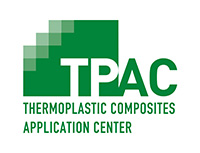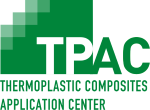Automotive parts in TPC
Research on production and assembly technology for structures in the automotive industry with the new generation of TPC materials.
Summary
DSM has developed a new composite material: uni-directional carbon fibre reinforced tape based on new engineering plastics (PPA and PA410). The polymers are new and have good mechanical properties. PA410 is also biobased and recyclable, and is ideally suited for the circular economy. DSM is investigating the applicability of these materials in structural applications in the automotive. Thermoplastic composite (TPC) is of interest to the automotive industry because of the possibility of:
- Lightweight construction;
- Manufacture parts that are recyclable;
- Manufacture parts with short cycle times (mass production).
The tape manufactured by DSM can be processed as such (e.g. by tape-laying or wrapping) but for many applications such as scalable products, it is necessary to first produce a semi-finished product in the form of a laminate. By stacking several layers of tape, a desired thickness and fibre orientation can be achieved, allowing the shell part to be optimally designed. DSM has selected a suitable part to demonstrate all facets of the material and the technology.
Until now, continuous-fibre composites have hardly been used in automotive applications. Continuous fibre composites include uni-directional fibre-reinforced plastics (UD tapes) or composites reinforced with fabrics. In automotive, these composites are often based on (virtually non-recyclable) thermosets. These materials are also less suitable for large series production. Although thermoplastic continuous-fibre composites are in principle much more suitable, they are (besides flat sheets/sandwiches) not yet or hardly applied in automotive industry. Composite UD tapes are now available, but end-users are not yet investing in composites. Buyers of the material, i.e. OEMs and Tier1 in the industry, do not have a clear picture of the intermediate processing steps, cycle times and the costs involved. Moreover, they are not well informed regarding the cost for e.g. required tools. DSM wants to work with parties that bring this knowledge to the buyers. Therefore, participation in this technology project at Saxion serves the implicit needs of buyers. Such technology partnerships also serve to realize the following:
- A demonstrator of industrial production capabilities using technology from Engel;
- Underpinning the possibilities of cooperation with Saxion, Centre of Excellence on application of composites and training in Composite technology, and
- A demonstrator of new materials and their applications.
Project partners
DSM
Duration
1 year, Start in September 2015
Funding
Partly financed by Tech For Future, Centre of Expertise HTSM Oost.



